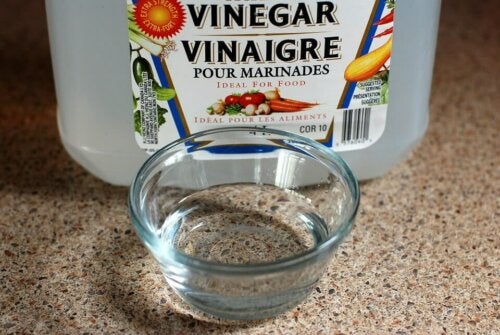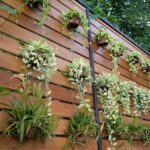Vinegar has many advantages for cleaning the home and can also be used to solve different problems in the garden, such as the appearance of insects and some fungi.

Many household items and products are suitable for other functions. For example, vinegar, in addition to being used for salads and household cleaning, is also used to care for garden plants.
The properties of this liquid, present in most homes, make it a good option when it comes to avoiding pests and helping plants grow. Next, we tell you more about it.
7 ways to use vinegar in the garden.
1. As a herbicide.
The main quality of vinegar is acidity. This is due to its content of acetic acid, which causes chemical reactions when it comes into contact with plants. However, it must be clarified that its effect is short-term and, therefore, it will not be as effective as weeding with other products or manually.
It can be used to remove small weeds, like those that grow in tile joints, for example. Just pop it into a spray bottle and spray.
2. As an antifungal.
Just as it is used to eliminate weeds, using vinegar in the garden allows you to get rid of the fungi that affect plants.
Its effect is similar to that of sodium bicarbonate: while it raises the pH and generates an alkaline medium that prevents the proliferation of the fungus, the vinegar lowers it and forms an acidic medium, also unfavorable for them.
How to use it? One tablespoon of vinegar should be diluted in two liters of water and applied on the leaves, twice a week, and after each period of rain.
3. Get a more acidic soil.
As mentioned above, vinegar lowers the pH of the medium that contains it. In this case, it will be used to make the soil more acidic. For this, you just have to combine a cup of vinegar with a gallon of water, and spread it on the floor.
This procedure can offer two advantages:
- First, it will be positive for the growth of plants such as azaleas, roses, lavender, blueberries, and gardenias, which need acidic soils.
- It will also help the earth release iron, a very beneficial mineral for them.
4. Ant repellent.
If an anthill has chosen your garden as its headquarters, you can use vinegar to eradicate it. To achieve this, this product must be sprayed, undiluted, over the anthill for a couple of days. Little by little, you will see how they begin to move away from there.
Of course, you can also do this in other spaces of the house, since vinegar is recognized as a natural insecticide. In addition, its moderate use does not have any adverse effect on health.
Also, it works with other types of insects that can attack your plants. By sprinkling some vinegar on the leaves, you can scare off snails and slugs.
5. Fertilizer for potted plants.
In this case, we tell you a secret that will help you to have healthier plants in the pots. Combine two tablespoons of apple cider vinegar with three liters of water and water the soil in the pot with this preparation. Go ahead and try it!
6. Flower vitalizer.
If you like to decorate with flowers in vases, vinegar can do the trick. Thanks to this, the duration of the flowers will be greater; you just have to add two tablespoons of this liquid and two more of sugar in a liter of water. Then, pour this mixture into the vase and place the flowers. About every 5 days, cut the flower stems and change the solution.
7. Remove rust from tools.
Using vinegar in the garden will not only be useful for plants. The work elements can also take advantage of their virtues. To clean rusty tools, apply pure vinegar on them and they will be ready after a rinse.
Another good alternative is to soak the tools in pure vinegar for about 20 minutes. Either method is effective and easy to do.
Vinegar in the garden: what to remember?
Although vinegar is beneficial for the tasks in the previous list, keep in mind that it should not be applied directly on the plants. Due to its pH, in some it can be harmful. Better to dilute it and use it sparingly.


